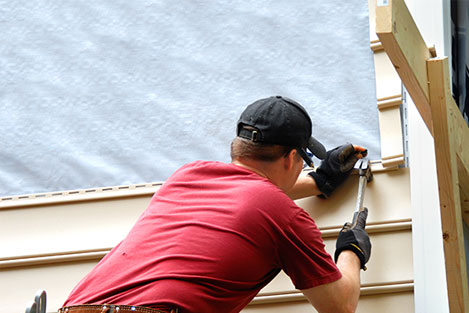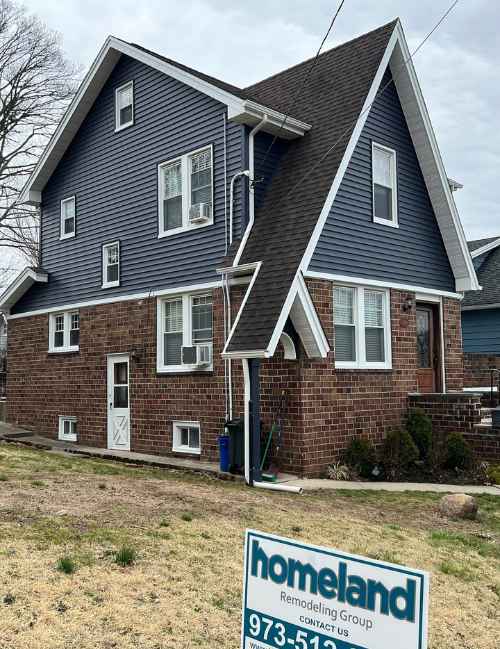Transform Your Home with the Help of a Skilled Morris Siding Contractor
Transform Your Home with the Help of a Skilled Morris Siding Contractor
Blog Article
The Vital Overview to the Different Sorts Of Exterior Siding and Their Unique Advantages
In the world of home renovation, choosing the ideal home siding is a critical choice that influences both visual allure and useful performance. With so numerous options to take into consideration, which siding product absolutely stands out for your particular project?
Wood Siding
Timber home siding, a prominent choice for residential outsides, uses an ageless visual that integrates natural elegance with architectural integrity. This siding product is readily available in various designs, including clapboard, roof shingles, and board-and-batten, allowing house owners to customize their façade to match their layout preferences. Timber house siding is commonly crafted from resilient species such as cedar, redwood, or want, which are known for their strength and capability to withstand environmental stressors.
One of the main advantages of timber exterior siding is its exceptional insulation properties, which can contribute to power efficiency and reduced heating expenses. Additionally, wood home siding is eco-friendly, making it an eco-friendly choice when sourced sustainably. Regular upkeep, including painting or staining, can lengthen its lifespan and improve its appearance, enabling homeowners to protect the all-natural beauty of the wood.
However, potential drawbacks consist of susceptibility to insects, rot, and weather condition damage, demanding sufficient treatment and maintenance - morris siding contractor. Regardless of these worries, when properly cared for, wood siding can offer a stunning and durable remedy that enhances the personality of a home while offering a warm, inviting atmosphere

Plastic Siding
Plastic siding has arised as a leading option for home owners looking for a low-maintenance exterior alternative that combines sturdiness and cost. This functional product is crafted from polyvinyl chloride (PVC), making it resistant to different climate condition, including dampness and UV rays. Therefore, vinyl home siding does not warp, rot, or fade, guaranteeing long-lasting aesthetic charm.
Among the key advantages of vinyl house siding is its extensive series of shades and styles, enabling house owners to attain the wanted search for their building without the demand for constant repainting. Furthermore, plastic house siding is simple to install, which can substantially reduce labor prices throughout construction or remodelling projects.
Plastic exterior siding also adds to energy performance. Lots of alternatives feature insulation support, which enhances thermal efficiency, assisting to keep comfortable interior temperatures and potentially decreasing energy bills. Furthermore, its smooth surface area promotes easy cleaning, needing only routine washing with a garden pipe to eliminate dirt and particles.
Fiber Concrete Siding
Fiber concrete exterior siding has actually obtained traction among homeowners and builders alike due to its impressive mix of sturdiness and visual convenience. Made up of a mixture of cellulose, sand, and cement fibers, this exterior siding choice is crafted to hold up against severe climate condition, consisting of high winds, hefty rain, and temperature level variations, making it a durable selection for household outsides.

Among the main advantages of fiber cement house siding is its resistance to pests, such as termites, and its non-combustible nature, offering improved fire safety and security. morris siding contractor. Additionally, it is readily available in a broad variety of textures, styles, and colors, allowing homeowners to achieve their wanted aesthetic without sacrificing performance
One more benefit is its low upkeep needs; fiber concrete home siding typically requires paint or discoloration every 5-10 years, which is less constant than various other materials. Its durability contributes to a lower general price of possession, as it reduces the requirement for regular repair services or substitutes.
Ultimately, fiber concrete exterior siding stands for a superb investment for those looking for a resilient, attractive, and versatile outside option, integrating both form and feature to improve the i was reading this home's curb allure.
Metal Home Siding
The attraction of steel exterior siding hinges on its durable durability and contemporary visual charm, making it a favored choice for modern style. Offered in materials such as light weight aluminum and steel, steel home siding uses a series of shades and coatings, allowing homeowners to accomplish a customized look that enhances their design vision.

Energy effectiveness is an additional significant benefit, as lots of steel house siding products are made with insulation choices that aid regulate interior temperature levels. This can lead to minimized energy costs with time. Furthermore, steel exterior siding is usually recyclable, making it an eco pleasant option for sustainability-minded property owners.
The setup procedure for metal siding can be reasonably straightforward, causing a quicker turnaround time for building jobs. Overall, metal exterior siding incorporates performance and design, making it a functional option for those looking for a long-lasting and aesthetically appealing outside finish.
Brick and Rock Exterior Siding
Brick and stone house siding stands apart as a timeless selection that boosts the aesthetic beauty of any kind of home. Understood for their longevity and low maintenance, these materials provide a phenomenal roi while boosting the property's visual appeal. Readily available in various colors, textures, and patterns, brick and stone can be tailored to fit varied building designs, from typical to contemporary.
Among the primary advantages of block and stone house siding is their energy efficiency. Both products have all-natural insulating buildings that aid control indoor temperature levels, potentially minimizing home heating and air conditioning costs. In addition, they use premium fire resistance contrasted to various other home siding alternatives, adding to improved safety and security.
An additional advantage is their long life. Brick and rock can last for years, often calling find here for minimal maintenance beyond periodic cleansing. Unlike wood house siding, they are invulnerable to insects and rot, guaranteeing a lasting exterior that holds up against the components.
Verdict
In summary, the choice of house siding considerably impacts a home's visual allure, power performance, and maintenance needs. Each type of siding-- whether timber, vinyl, fiber brick, concrete, or steel and stone-- offers distinct advantages tailored to different house owner preferences and ecological conditions.
One of the key benefits of timber exterior siding is its superb insulation residential properties, which can contribute to power efficiency and lower home heating prices. hop over to these guys Furthermore, wood house siding is biodegradable, making it an ecologically friendly option when sourced sustainably.One of the primary benefits of metal exterior siding is its resistance to different ecological elements.Power performance is an additional significant benefit, as many steel siding items are made with insulation options that assist regulate interior temperature levels. Each kind of exterior siding-- whether wood, plastic, fiber concrete, block, or metal and rock-- offers special advantages tailored to various house owner preferences and environmental problems.
Report this page